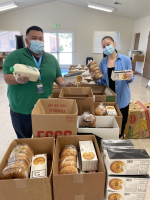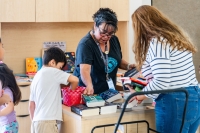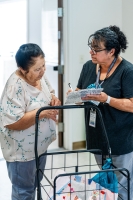Connecting Patrons to Critical Services/Resources
Santa Clara County Library District
Innovation Synopsis
Modern libraries serve multiple functions for the communities they represent, combining their traditional role of providing access to reading materials and offering programming with expanded responsibilities that address other local needs. The Santa Clara County Library District (SCCLD) has created two community outreach specialist (COS) positions to address complex patron issues that other library positions do not have the expertise to engage in. Connecting patrons with government and other socially based services and performing outreach to groups in need of these resources and services expands the library’s role as a vital community hub and meets the needs of individuals in a way that is culturally competent and effective. The success of this program has led SCCLD to plan for five more positions, allowing for greater outreach around a growing variety of community needs serving residents at each of our community libraries and beyond throughout the County of Santa Clara.
Challenge/Opportunity
Our County is a large (around 2 million residents) and diverse place, with over 40% of the population born abroad. Many residents are limited English proficient. There are over 10,000 community members who are unhoused, many of whom frequent the library as a welcoming public space. SCCLD represents nine cities at eight locations, which are spread out over a large geographic area with multiple County, state and federal officials representing our area. Librarians are extremely adroit in researching to find information for patrons, including how to access government resources, but certain types of assistance require broader familiarity with public and nonprofit services, or longer-term relationship building when attempting to interact with populations who might be facing multiple challenges. The County has social workers and case managers assigned to departments tied to accessing services, but they rely on individuals knowing how to reach out to them and follow numerous steps exactly.
Key Elements of Innovation
Our community outreach specialists are in-library resources for our staff who can connect individuals with a variety of services, including accessing immigration, housing, and health services, unemployment benefits and job placement training. At the same time, these specialists go out to where the need is in the community. Services range from working to bring food and reading materials to day laborers at their housing sites, to searching for temporary and long-term housing options for individuals facing homelessness. The workload varies according to which community within our district they are focused on, but the overall mission is the same, to help improve people’s lives in crucial ways. Specialists can be found at our libraries and in the field to make them accessible to as many people as possible. They have the bandwidth and experience to take the time to help navigate some of the most complex bureaucratic paths, connecting with individuals with language and other barriers.
Achieved Outcomes
The cities in our District have been enthusiastic about this program, turning to our Specialists to assist with complex constituent cases. Library staff are appreciative of the ability to assist patrons with critical needs.
For six months of the year, the South County specialist worked partly out of a 100-unit family housing complex for day laborers in the city of Gilroy, providing 185 families with food monthly and running a three-month Zumba class for 151 individuals. She also participated in library community events and collaborated with local nonprofits.
The North County specialist works with the cities of Milpitas and Cupertino, Catholic Charities and other local nonprofits, and County departments, including Public Health and Public Works. He held 225 appointments on topics ranging from shelter, legal assistance, immigration, unemployment benefits, career and medical services.
650 seasonal personal care kits were also created as part of the program for community distribution.



